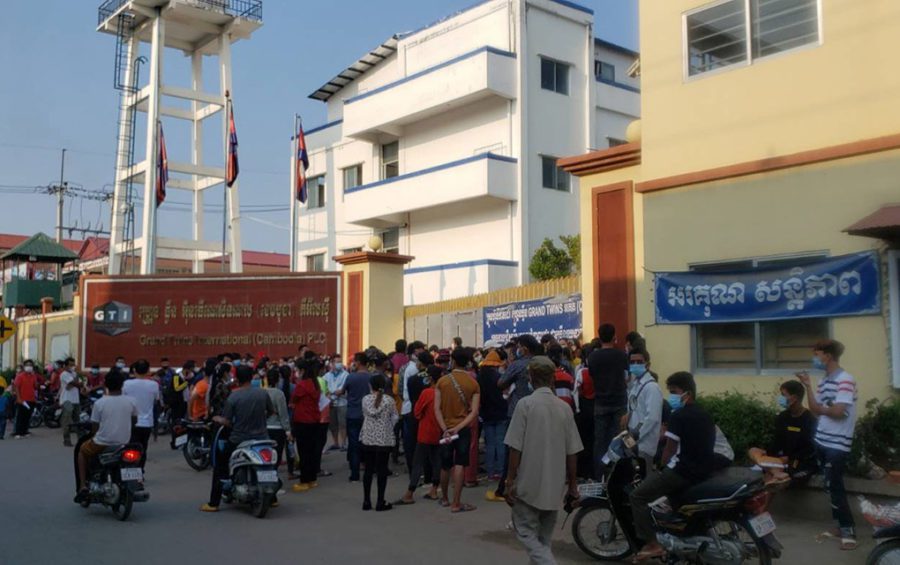Covid-19 outbreaks of hundreds of workers are continuing to hit garment factories in and out of Phnom Penh, as factories navigate whether to suspend operations or keep up production.
Thousands of nervous workers have previously protested over their fear of infections, while others have rallied to get vaccines so they can get back to work and start earning an income again.
Since the country’s first major Covid-19 outbreak this year, factory staff have been a focal point of transmission. Phnom Penh’s lockdown “red zones” were centered around areas of workers’ accommodations, while other provinces have seen significant clusters linked to factories. Local authorities have suggested that commutes in close quarters — workers typically cram into the backs of trucks to get to work — made the populations particularly vulnerable to Covid-19.
Far Saly, president of National Trade Union Coalition, said on Monday that factories in Phnom Penh and Kandal province were still seeing hundreds of Covid-19 cases.
Y&W Garment in the capital’s Dangkao district had found about 500 cases, according to Saly. The factory has almost 5,000 total workers, according to an industry listing, and the 500 cases had been found in two buildings where about 1,000 employees work, Saly said.
Workers corroborated the outbreak in the two buildings, but Y&W administrative manager Thy Bunthon denied Saly’s figures while declining to comment further, saying he was in a meeting.
One worker said the two buildings where Covid-19 cases had been found were shut down, but nine other Y&W buildings continued to operate.
In Kandal province’s 7NG Road area — across the Mekong river from Phnom Penh — several factories had been hit by Covid-19, including Starlight Apparel in Khsach Kandal district’s Vihear Suor commune, Saly said. Starlight had found about 250 cases among 1,700 workers, he said.
Outbreaks at factories outside Phnom Penh were of greater concern as workers typically lived with their families — rather than in dormitory-style housing as in the capital — elevating the risk of transmission to the wider community, he said.
“If they have Covid, it means they [likely] shared it with their family or villagers. That is a challenge, and [quarantine] must be done by the whole family. And that is a serious economic problem burdening them. That is a big problem,” Saly said.
Starlight’s assistant manager, Sou Channarat, confirmed the 250 cases, and said the factory was working with local authorities to test all workers and keep them safe.
Those who test negative are being vaccinated, and those who are positive sent to quarantine or treatment centers, Channarat said.
“The workers, as we already know, they take vans together, squeezing in with each other, and they don’t pay much attention to bodily hygiene or wearing a mask. We have tried to explain this to them, but some people said wearing a mask makes it difficult to breathe. That’s a problem that might cause the spread,” he said.
Pav Sina, president of the Collective Union of Movement of Workers, said the economic costs were mounting for the industry due to the disruptions to production.
“The workers take [transport] together and stay in crowded quarters,” Sina said. “All in all, it’s a challenge.”
In Phnom Penh’s Choam Chao III commune, Phan Savary, a sewing line manager at JS Leather Collection, said her factory had reopened last week following a three-week closure.
About 50 Covid-19 cases had been found there, around the time a neighboring factory also saw hundreds of cases, Savary said.
There was not enough space to maintain social distancing at all times, especially during lunch hours at the factory, and workers were nervous, she said.
“Some people have been tested, but some people have not done it yet. So, they are all scared together,” she said.
One 26-year-old worker who declined to give her name said she was almost nine months pregnant, and asked to take leave until after she gave birth. But was denied as she was not due until July 9, she said.
“I’m worried because I’m scared there are infections,” the worker said.
JS’s administrative manager, who would only give his name as Bunna, said both the factory and local authorities wanted all workers tested, but some would not agree. The factory could not force them, but has now required proof of testing to return to work, he said.
“If they had their sample tested twice, they will have two blue ink marks, so we check to see if anyone hasn’t yet been tested,” Bunna said.
He added that mothers giving birth would be given three months of maternity leave as the Labor Law requires.
“The permission for three months will be allowed for sure, but it needs to be close to the birth month — meaning the ninth month. Though if they have a problem with their baby and have a notice from doctors saying that they must take rest earlier for their baby’s safety, we allow them to take the days off,” he said.
Labor Ministry spokesperson Heng Sour could be reached for comment. Garment Manufacturers Association in Cambodia spokesperson Ken Loo declined to comment.













